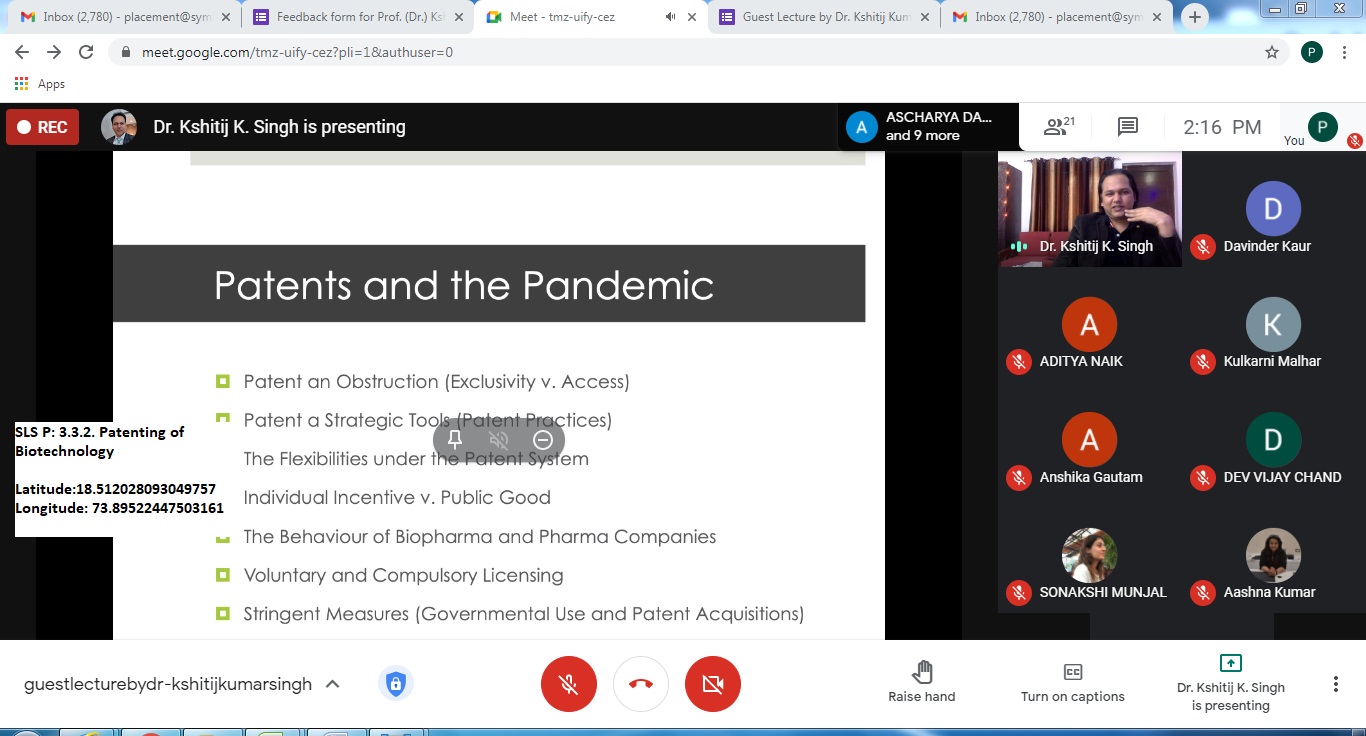.jpg)
Symbiosis Law School, Pune’s Placement Cell organised a guest session cum workshop on “Patenting of Biotechnology” by Prof. (Dr.) Kshitij Kumar, Assistant Professor at Campus Law Centre, University of Delhi Convener, Legal Aid Society, CLC Guest Faculty SAU (IPR) on 8th April 2021, Thursday; 4:00 PM - 5:00 PM. Around 44 students from 2016-21 B.A/B.B.A L.L.B. (Hons.), 2018-21 of L.L.B. and 2020-21 of LL.M, 2017-22 of 5 Year B.A/B.B.A L.L.B. (Hons.) & 2019-22 of 3 Year L.L.B. attended the event.
The session focused on Modern biotechnology discoveries have presented new problems to countries' current patent rules, as biotechnological inventions differ significantly from chemical and mechanical inventions, which have traditionally been the subject of patents. With the advancement of human genomics and the accomplishment of the Human Genome Project, the gene's informational content, rather than its physical properties, has become more essential (physical attributes). Patent law is largely concerned with issues that arise within a jurisdiction. Although the World Trade Organization (WTO) member countries' patent laws have become more unified as a result of the adoption and ratification of trade-related aspects of intellectual property rights (TRIPS), these countries have taken different approaches to biotechnology patents in accordance with their national policies. As a result, biotechnology patent scope and coverage differ from country to country. Even in countries with identical patent laws, such as the United States and Canada, court interpretations differ greatly. These differences between countries are crucial for a proper understanding of biotech patent trends. As a result, the current chapter conducts a comparative analysis of biotechnology patent laws and practises in the United States, Canada, the European Union, and India in order to identify common difficulties and disparities within and across them. The United States, as a pioneer in biotechnology research, has a significant influence on other countries; the European Union reflects the unified approach of different member states in a politically diverse system; and the European Union reflects the unified approach of different member states in a politically diverse system. Canada distinguishes between patenting higher life forms and lower life forms, whereas India represents developing country concerns.
To keep up with emerging biotechnology advancements, the international patent regime faces a significant challenge. Biotechnology inventions face challenges in obtaining adequate patent protection under the worldwide patent system (especially genetic inventions). The TRIPS Agreement establishes baseline requirements for member countries to follow when granting patents; nonetheless, it leaves open questions about the meaning of a number of categories, including invention, microorganisms, microbiological processes, and, more broadly, biological processes. Given their comparatively slow rate of scientific and technical growth, these gaps and uncertainties have a significant impact on developing countries. TRIPS' technology neutrality prevents biotechnology inventions from receiving preferential treatment. The international patent regime is the product of member countries' attempts to harmonise patent laws and establish a consistent set of standards for the entire world. However, in the case of biotechnology patents, the disparities in patent policies among member countries make it difficult to establish a global norm. Furthermore, there is a political difference between developed and developing countries, with wealthier countries pushing to increase the scope of patentable subject matter by removing exceptions from the TRIPS language, while poor countries are opposed.
Given the disagreement surrounding topics such as patenting plants and animals, creating a uniform set of patenting principles for the entire world has proven extremely challenging in the biotechnological environment. Both uniformity and diversity have advantages and disadvantages, and the question is how much inter-jurisdictional diversity and rivalry should be surrendered in the pursuit of global consistency.
The event came to a close with a vote of gratitude from the Symbiosis Law School's placement cell in Pune.
Geotagged Photographs:

Title: Patenting of Biotechnology
Details of Resource Person:
Resource Person: Prof. (Dr.) Kshitij Kumar, Assistant Professor at Campus Law Centre, University of Delhi Convener, Legal Aid Society, CLC Guest Faculty SAU (IPR)